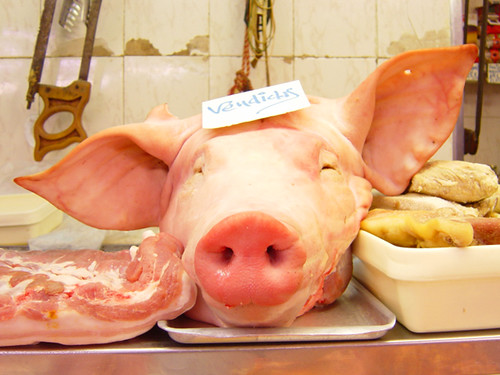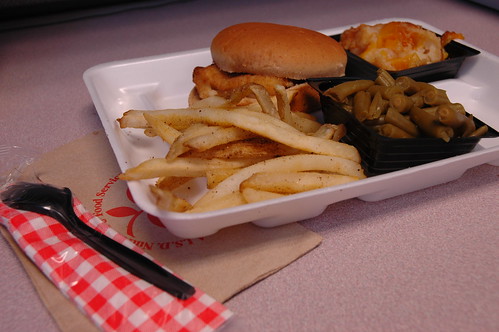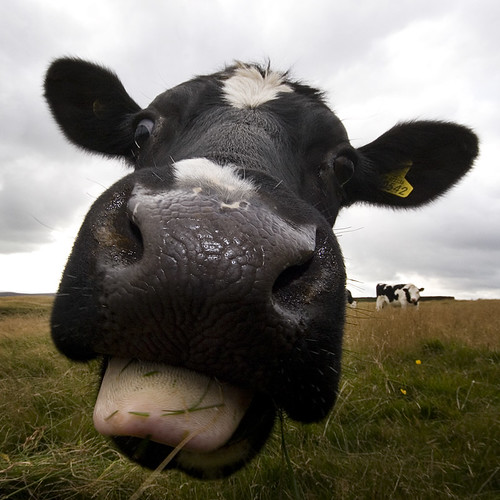
Via Serious Eats:
The buzz at the Toronto Film Festival this month was all about food. The new documentary, "Food Inc.," premiered at the festival to rave reviews. Entertainment Weekly called it "an important movie, one that nourishes your knowledge of how the world works," the Los Angeles Times labeled it "a riveting cautionary tale," and Variety says it's "a civilized horror movie for the socially conscious, the nutritionally curious and the hungry."
From the film's Web site:
Our nation's food supply is now controlled by a handful of corporations that often put profit ahead of consumer health, the livelihood of the American farmer, the safety of workers and our own environment. We have bigger-breasted chickens, the perfect pork chop, insecticide-resistant soybean seeds, even tomatoes that won't go bad, but we also have new strains of e coli--the harmful bacteria that causes illness for an estimated 73,000 Americans annually. We are riddled with widespread obesity, particularly among children, and an epidemic level of diabetes among adults.
Featuring Eric Schlosser ("Fast Food Nation"), Michael Pollan ("The Omnivore's Dilemma") along with forward thinking social entrepreneurs like Stonyfield Farms' Gary Hirschberg and Polyface Farms' Joe Salatin, FOOD, INC. reveals surprising -- and often shocking truths -- about what we eat, how it's produced, who we have become as a nation and where we are going from here.
I might first argue the pork chops we have are far from perfect. They tend to be dry as farmers have bred increasingly lean pigs to combat the growing paranoia about animal fat. The upshot? Unsatisfying pork chops often drenched in high-calorie sauces or pan seared in butter (delicious, I agree, but it should be an unnecessary step when cooking pork). Worse is some kind of ultra-light Frankenstein monster of processed vegetable oil emulsified via partial hydrogenation. Sounds good for you, doesn't it?
We face increasing challenges in our food supply. The oceans are ravaged, agribusiness provides vegetable crops tainted with untested poisons, and meat comes from factories. However, we can ease these challenges by making good food more easily accessible.
Here in Gainesville, I'd have to drive to three different places on at least two separate days to collect food for the week. It's a sacrifice, and I feel appropriately guilty confessing this, I'm not yet willing to make. Can't make, in some respects, as the closest farmer's market is on Wednesday evenings when I'm scheduled to teach, and the Alachua County Farmer's market seems to have been supplanted by the new market far west of town. So yes, I could wake early on Saturday mornings and walk the stands at Haile Plantation, browse for zucchini amid stalls of homemade candles and dreamcatchers, but I really don't want to.
I may need to, however. Eating well isn't easy. I know this and understand it. And as evidence mounts towards the detrimental effects of food either processed or farmed on a large scale, the choice of going to the local supermarket might be one I can no longer conscionably give myself.



 Why do you think involving children in growing food and preparing it can make such a big difference for kids?
Why do you think involving children in growing food and preparing it can make such a big difference for kids? My solution is not to try to feed children in the same way that fast food nation does — which is to figure out a gimmick to get them to eat something. It’s to bring them into a whole relationship with food that’s connected to nature and our culture.
My solution is not to try to feed children in the same way that fast food nation does — which is to figure out a gimmick to get them to eat something. It’s to bring them into a whole relationship with food that’s connected to nature and our culture.








